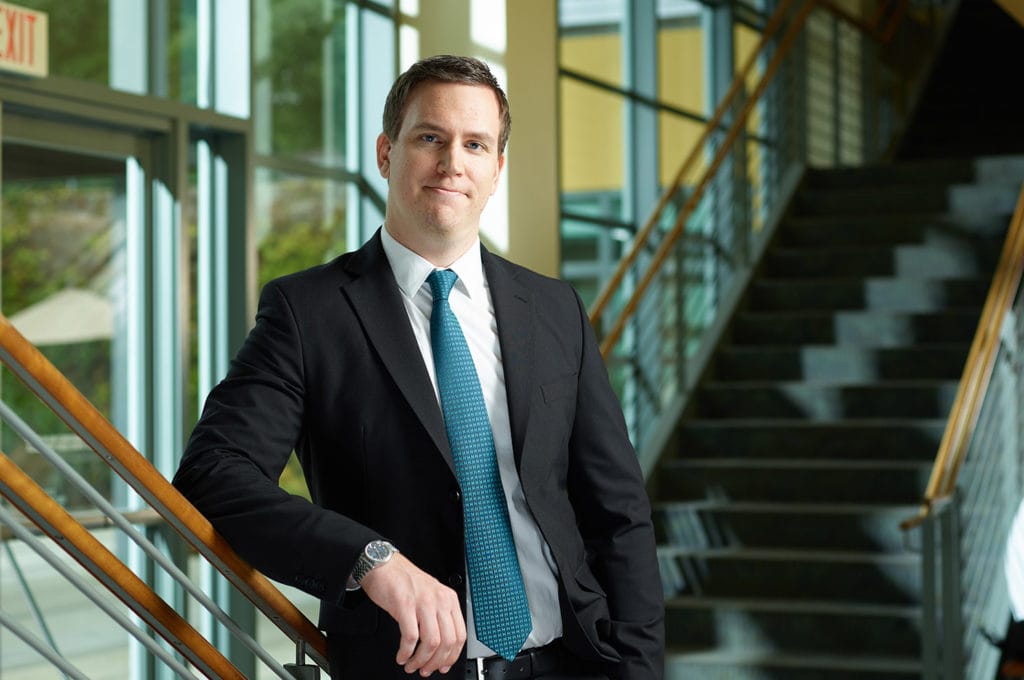Easing the Burden of Constructing New Energy Infrastructure Projects

They may carry “green” energy, but the process by which the locations for natural gas pipelines, wind farms, and high-voltage power lines are determined and developed isn’t always pretty.
Local residents oppose such projects, complaining they pose a potential threat to the quality of life in their neighborhoods. Policymakers and energy officials find their efforts to meet sustainable-energy needs snarled up in gridlock and costly delays.
Kristoffer Wikstrom might have a way out of this mess.
The doctoral candidate in the School of Social Science, Policy & Evaluation’s Division of Politics & Economics (DPE) has conducted research that could improve outcomes and engage citizens in helping to decide where and how such projects are built, a process called infrastructure siting. His scholarship was recognized for excellence recently both by CGU and Los Angeles’ leading supporter of social science research.
With the multitude of sustainable-energy projects proposed across the globe, Wikstrom’s work is topical.
“It is estimated that trillions of dollars will be spent on renewable energy, transmission, and distribution infrastructure just to meet the Paris Accord agreements,” Wikstrom said. “It is therefore important to minimize any potential conflicts that can lead to delays and increased costs for tax- and rate-payers. Even more important, it is crucial to make sure that poor communities are not the ones who disproportionately suffer the burdens of these new energy infrastructure projects.”
Wikstrom was recently named the recipient of a Haynes-Lindley Doctoral Dissertation Fellowship for his dissertation proposal entitled “Agents of Opposition? Simulating Community Conflict Over New Energy Facilities.”
Wikstrom’s research combines geographic information systems (GIS), agent-based modeling—a method of studying complex systems composed of independently acting individuals—and simulations to explore questions such as:
- Does the distance that citizens live away from proposed energy projects have an impact on their actions?
- How do their attitudes and behaviors change over time?
- Can researchers predict the specific moment in time—the “tipping point”—when enough citizens organize to successfully thwart a project?
The $20,000 fellowship from the John Randolph Haynes and Dora Haynes Foundation will support Wikstrom’s continuing research. The organization is the oldest private foundation in Los Angeles, and it spends up to $3 million annually for grants and scholarships to public and private institutions, funding hundreds of important urban studies in education, transportation, local government, elections, public safety, natural resources, and other areas.
Wikstrom’s work could serve as a “powerful tool for helping policy makers create sustainable communities, as well as sustainable infrastructure growth.”
“Energy infrastructure is all around us, and crucial to society,” he said. “At the same time, the infrastructure can be harmful to the environment and communities.”
Wikstrom was also the recipient of a Transdisciplinary Dissertation Award totaling $10,000, also to support his research. This award recognizes students who have embraced a transdisciplinary research approach and developed compelling and feasible projects.
“The simulation of infrastructure siting is, at its core, a transdisciplinary task that demands theories and tools from several different fields of study, such as politics, social psychology, economics, and engineering, just to name a few,” he said.
Wikstrom has previously worked as a research assistant for a Haynes Foundation grant on power struggles, which led to the creation of energymaps.org, a website where communities can get information about upcoming local infrastructure projects.
Since 2016, he has served as the project manager for a National Science Foundation (NSF) grant on sustainable energy solutions. The grant, from the NSF’s Division of Civil, Mechanical, and Manufacturing Innovation, was recently transferred to Portland State University, where Wikstrom and environmental energy expert and now-former CGU Professor Hal Nelson expect to complete the project by early 2019.
Wikstrom credited his dissertation committee, which is chaired by Nelson, and includes DPE Professors Heather Campbell, an expert in public policy, and Melissa Rogers, a specialist in local-level governmental conflicts.
“The combination of support and encouragement I’ve had throughout my years at CGU, has truly been the reason that I’ve been able to get this point,” he said.